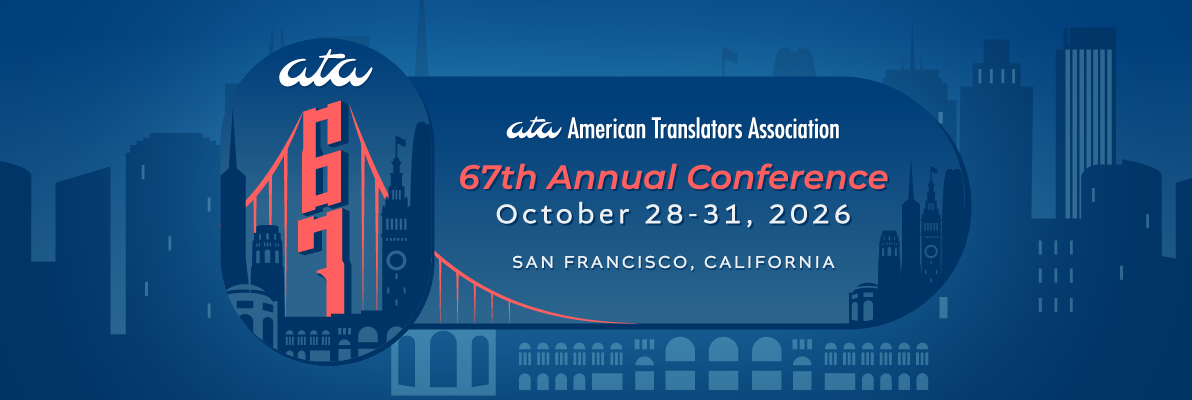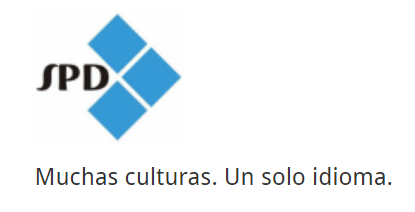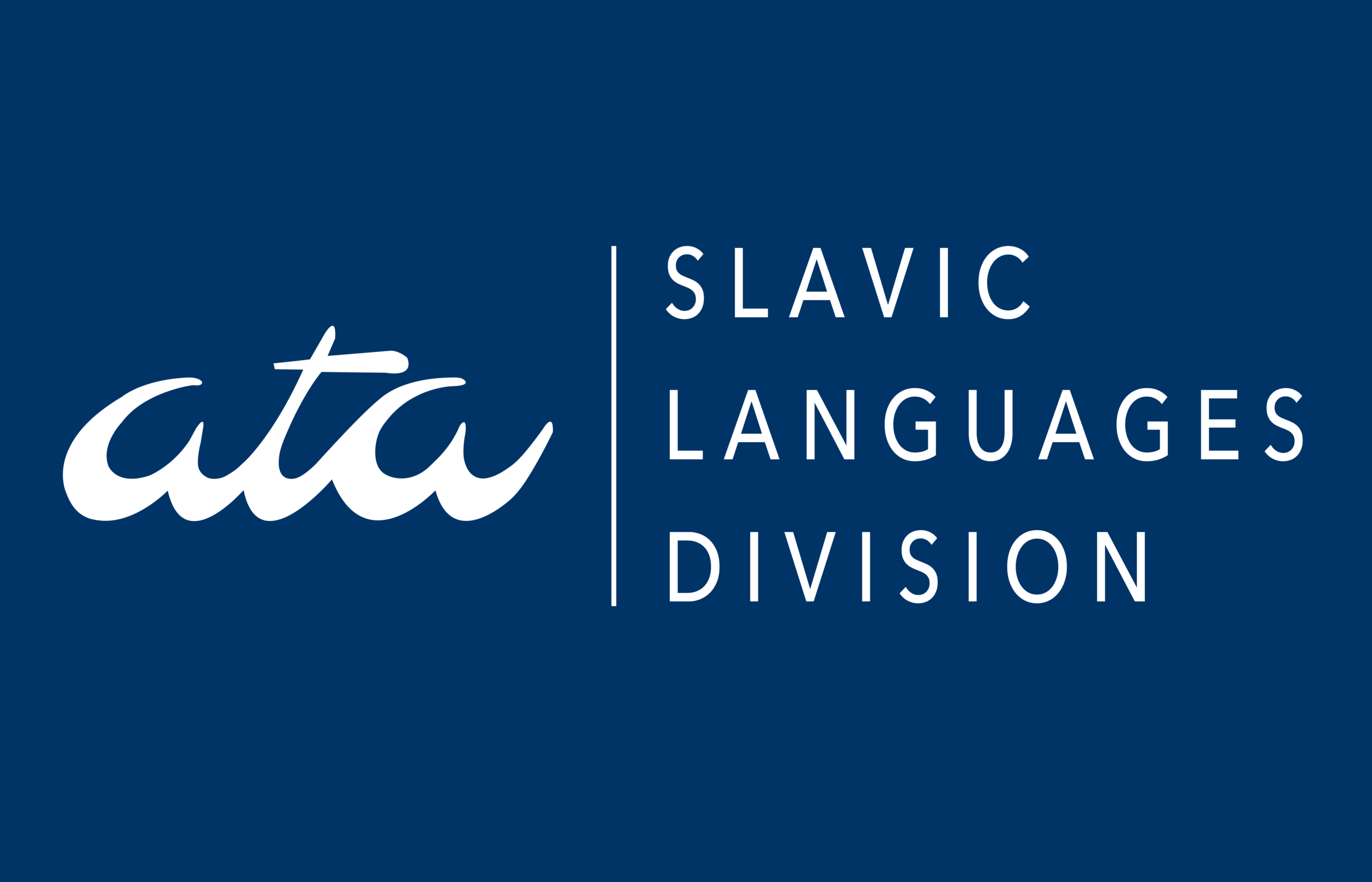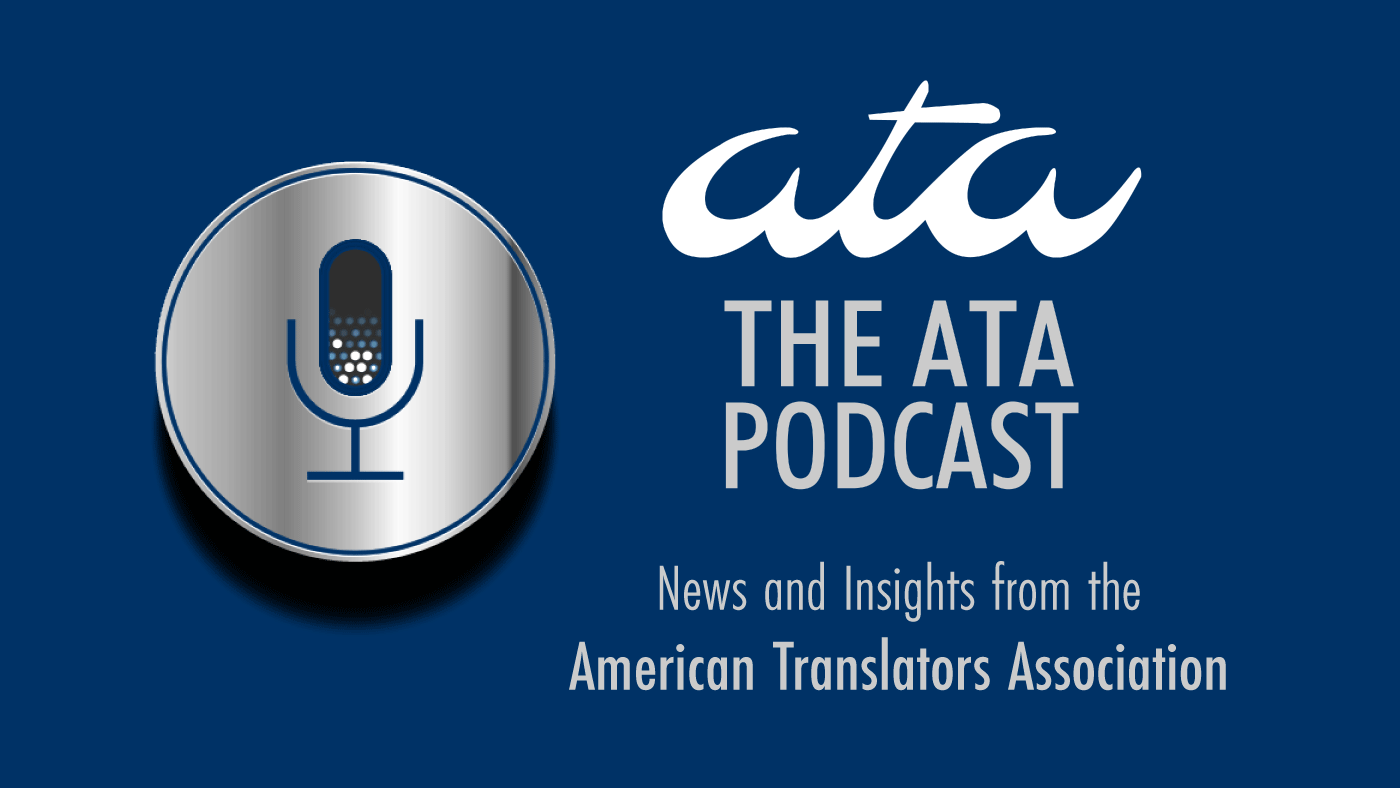What's Happening Now?
ATA provides a snapshot of the current news, events, articles, podcasts, and more. ATA members receive a monthly e-newsletter that highlights this vital information.
Call for Speakers
ATA is now accepting session proposals for ATA67. We seek advanced, specialized, relevant, and original content that will give attendees an edge in their careers, set them apart from the competition, and provide an advantage over AI. ATA67 will be a fully in-person conference.
Open to Everyone
You do not have to be an ATA member to submit a proposal.
By contributing to the advancement of your profession, you will build your reputation and résumé, widen your networking circle, and position yourself as a key player to help shape the future of the T&I industry.
Proposals will be chosen through a competitive peer-review process. The Conference Organizer, along with experts in the relevant language and subject area, will assess each proposal’s relevance and its potential to engage the audience and stimulate discussion.
Submit Your Proposal by March 6!
Book Your Room Today
ATA67 will be held at the Hyatt Regency San Francisco. The hotel is located near San Francisco’s Embarcadero Center. Known for its stunning bay views, historic piers, and pedestrian-friendly promenade, the area is easily accessed by BART, MUNI, and ferries.
Special Rates
- $279: Single/Double Occupancy
- $304: Triple Occupancy
- $329: Quadruple Occupancy
Rates are exclusive of tax. ATA67 rates at the Hyatt are available until October 6, 2026, or as space allows.
Beware of Booking Scams
The only way to make reservations at the guaranteed ATA rate is to contact the hotel directly. If you are contacted by anyone claiming to represent ATA or the hotel, please obtain the name, phone, and email, and contact Inge Hafkemeyer at inge@atanet.org.
 The 2026 Nominating and Leadership Development Committee is pleased to announce the call for nominations from ATA’s membership to fill the following positions:
The 2026 Nominating and Leadership Development Committee is pleased to announce the call for nominations from ATA’s membership to fill the following positions:
- Treasurer (one position for a one-year term)
- Director (three positions, each for a three-year term)
The elections will be held online. Voting members will be sent their proxy voting information in early October.
Who Is Eligible to be Nominated?
Under ATA’s Bylaws, all Active members of ATA are eligible to run for elected office. Active members are those who have passed an ATA certification exam or who are established as having achieved professional status through Active Membership Review or through the Credentialed Interpreter recognition process.
Active members must be citizens or permanent residents of the U.S. Other member categories are not eligible to serve as officers or directors. However, any member may submit a nomination.
Members of the Nominating and Leadership Development Committee are not eligible to run for elected office.
Submitting Your Nomination
Any ATA member may submit a nomination. Self-nominations are also permitted and encouraged.
Members may make a nomination using the online form on the elections page. Nominations should be submitted as early as possible so the Nominating and Leadership Development Committee can fully consider proposed candidates.
ATA actively works with government agencies and organizations on the issues that affect you. Through ATA's advocacy efforts, you will benefit from the success we achieve together. Being an ATA member supports these efforts.
The Wisconsin State Assembly passed Assembly Bill 377 (AB 377), which would establish English as the official state language and allow state agencies to use artificial intelligence tools instead of providing interpreters during court proceedings. The bill now advances to the state senate.
AB 377 was introduced in July 2025, four months after an executive order signed by President Donald Trump that established English as the official language of the U.S. AB 377 would require that most government communications to citizens be provided in English.
Representative David Murphy, who coauthored AB 377, said the bill will promote societal cohesion and save costs incurred from providing interpreters.
“One of the important things about having an official language for society is that language draws people together, and I think it’s really important to give a society cohesiveness with people who speak the same language,” Murphy said.
“You want to make it legal to use AI as an interpreter, which might be useful for ordering lunch, but certainly not sufficient for legal hearings, official forms, and civil rights — not to mention that this implementation of AI would, quite literally, take jobs away from Wisconsinites who work as interpreters,” said Representative Priscilla Prado, who chairs the Wisconsin Hispanic Legislative Caucus. “If efficiency were the goal, we would be talking about improving language access, not political symbolism. Wisconsin does not lose its identity because Spanish or another language is spoken. What it does lose is credibility when it ignores a substantial part of its population.”
Joseph Salmons, a professor of linguistics at the University of Wisconsin-Madison and a member of the American Civil Liberties Union, said measures to make English an official state language have had limited yet negative effects.
“The bill sends a signal, and it’s the same signal the executive order sent, which is that other languages are not welcome here,” Salmons said. “It’s damaging to the fabric of communities.”
[Note: ATA encourages members to email or call Wisconsin legislators now.]
The Badger Herald (1/21/26) By Abigail Wandersee
Since 2022, certified medical interpreters (CMIs) and administrators in the Workers’ Compensation Interpreter Group within the Northern California Translators Association (NCTA) have expressed concern about the misuse of the pre-certification HUB-CMI (HUB for Credentialed Medical Interpreters) badge issued by the National Board of Certification for Medical Interpreters (NBCMI).
Specifically, the group and the NCTA at large report a widespread and growing trend of non-certified individuals accepting interpreting assignments reserved for CMIs. State regulations explicitly require fully certified interpreters for high-stakes medical-legal evaluations.
To uphold due process for working-age Californians who speak a language other than English at home, the Department of Workers’ Compensation mandates that an interpreter be present at all medical treatment appointments, legal depositions, and hearings.
The NCTA has documented numerous incidents where non-certified individuals were erroneously permitted to interpret at these frequent workers’ compensation evaluations, which by law are reserved for highly qualified, fully certified interpreters.
The issue is not just the lack of full certification, but also how those credentials are presented. Certification advocates allege that a number of HUB-CMI credential holders are intentionally misrepresenting themselves as “fully certified” to medical office staff.
HUB-CMI is a preliminary, non-renewable entry-level interpreting credential. It indicates that an individual has passed a written examination in English only, demonstrating a baseline knowledge of the medical interpreting profession.
CMI is the full certification granted by the NBCMI. It requires passing both the written exam and a rigorous oral examination in a specific language. The proper credential designation includes the language, such as “CMI-Spanish.”
Advocates for certified interpreters argue that credential misrepresentation, including expired pre-certification status, is a direct violation of the NBCMI’s own disciplinary policy, which lists “fraud or misrepresentation of the NBCMI credentials” as grounds for sanctions.
“It would be simply devastating to see NBCMI or other certified interpreters, who have spent considerable resources on training and testing, be replaced by those who have not yet attained the appropriate credentials,” said Lorena Ortiz Schneider, a leading advocate for California certified interpreters.
“The National Board has emphasized that, as a certification body, we do not have the power to oversee the types of assignments that an interpreter takes,” said NBCMI Chair, Joanna Larson. “We have recommended that these concerns be taken to the relevant state body that oversees this legislation. Additionally, we have reminded CMI and HUB-CMI interpreters that they are responsible for being familiar with and abiding by any local laws in the area or areas that they serve.”
Slator (1/29/26) By Rocío Txabarriaga
Maine lawmakers are considering a bill intended to increase access to American Sign Language (ASL) interpreters by expanding the educational pathway to achieve certification and allowing more time to complete requirements.
The bill also aims to make it easier to mobilize communication more quickly in emergencies. In the immediate aftermath of the Lewiston mass shooting in 2023, for example, ASL interpreters weren’t immediately allowed into hospitals.
But Matt Webster, director of the Maine Association of the Deaf, said during a public hearing before the legislature’s Health Coverage, Insurance, and Financial Services Committee that the bill should be amended to further broaden pathways to certification.
“The Deaf community deserves qualified, experienced interpreters, and these amendments, while maintaining all quality standards, remove unnecessary barriers,” Webster said.
Maine Public (1/28/26) By Patty Wight
Illinois schools will soon receive incentives to expand dual language programs thanks to a new state law.
House Bill 3026 calls on the Illinois State Board of Education (ISBE) to adopt a comprehensive plan for school districts to establish or expand dual language education in their schools by December 15, 2026.
The law also requires Illinois to establish an optional pathway to recognize biliteracy at various levels before high school by July 1, 2027. That change would include milestones for bilingual students in Pre-K, fifth grade, and eighth grade to encourage early language development.
“These provisions stem from recommendations from the Illinois Advisory Council on Bilingual Education’s report,” said Senator Graciela Guzman, who sponsored the bill along with Representative Abdelnasser Rashid. “Most notably are the no-cost recommendations that would allow us to build up dual lingual language in our state in a critical way.”
The law requires ISBE’s Equity Journey Continuum to integrate dual language education into the broader framework of student learning to ensure that it’s considered an essential part of educational equity and excellence by July 1, 2029. This includes provisions for dual language teachers, focusing on recruitment, professional development, and retention of bilingual educators.
“As someone who grew up in a multilingual household, I can tell you firsthand that learning another language is an incredibly enriching experience,” Representative Abdelnasser Rashid said. “This bill doesn’t just expand dual language programs. It will improve academic achievement, enhance cultural preservation, and help our young people become well-rounded individuals with a better understanding of themselves and the world.”
WAND-TV (1/12/26) By Mike Miletich
Ireland’s Minister of State for European Affairs and Defense, Thomas Byrne, signed an administrative cooperation agreement for the provision of simultaneous interpreting services, including Irish, at informal ministerial meetings and summits to be held in Ireland during the country’s term as president of the Council of the European Union (EU) from July 1 to December 31, 2026
The presidency of the Council rotates among the EU member states every six months. During this six-month period, the presidency chairs meetings at every level within the Council, helping to ensure the continuity of the EU’s work in the Council.
The agreement marks a significant milestone in Ireland’s linguistic and cultural engagement with the EU and provides an opportunity to reaffirm Ireland’s commitment to multilingualism, along with full integration of the Irish language, in European affairs.
Minister Byrne was joined by the Director-General of the European Commission’s Directorate-General for Interpretation, Genoveva Ruiz Calavera, for the signing.
“Ireland’s 2026 EU presidency is a landmark because it is our first EU presidency since the Irish language assumed its full status as an official and working language of the EU,” Minister Byrne said. “I believe that the ability for ministers and officials from across the EU to engage fully in their own languages supports meaningful dialogue, effective negotiations, and good decision-making.”
Gov.ie (1/26/26)
More T&I News
Nebraska Bill Would Require Payment for Interpreters | Business Insurance
In Australia, Supreme Court Case Continues Despite More Than 200 Interpreting Errors | ABC News
Brattleboro Memorial Hospital Settles Complaint about Deaf Services | Brattleboro Reformer
Like Digging “Your Own Professional Grave”: The Translators Grappling with Losing Work to AI | CNN
ATA is continuously working to add more benefits for our members. In fact, there are so many, even longtime members might not be aware of everything ATA has to offer! Find out what you’ve been missing!
During this FREE, fun, and informative session, learn how to access your ATA member benefits and services, or just catch up on what’s new and get live answers to your questions from ATA’s Membership Committee.
There will be additional sessions this year if you can’t make this one. This live session is intended to be an interactive real-time experience and will not be recorded.
 ATA’s Mastermind Program uses a peer-based mentoring approach offering a combination of brainstorming, education, and support. Each year, the program connects members from various fields and language pairs for the purpose of holding virtual discussions on specific topics.
ATA’s Mastermind Program uses a peer-based mentoring approach offering a combination of brainstorming, education, and support. Each year, the program connects members from various fields and language pairs for the purpose of holding virtual discussions on specific topics.
Instead of a teacher presenting content, group members hold each other accountable for achieving specific goals. Every meeting follows a defined outline, which helps to share time fairly and ensures equal speaking time for all attendees.
Miami | February 27 – March 1, 2026
Registration is now open for Elévate 2026 – Miami, a three-day professional conference for translators, interpreters, and language professionals, jointly organized by ATA’s Florida chapter, the Association of Translators and Interpreters of Florida, and ATA’s Spanish Language Division, and hosted by Florida International University.
Join the SPD and ATIF in Miami for Elévate 2026, a three-day professional conference dedicated to innovation, excellence, and the future of translation and interpreting, with a focus on the…
Learn MoreJoin the Science & Technology Division for an hour of networking. This will be an informal meetup with non-recorded, small-group conversations where we share experiences and ideas based on an…
Learn MoreBy contributing to the advancement of your profession, you will build your reputation and résumé, widen your networking circle, and position yourself as a key player to help shape the…
Learn MoreReady to transform your digital workday? Learn how to turn technology into your greatest ally for well-being and peak performance! Are endless hours in front of screens leaving you fatigued?…
Learn MoreThe Slavic Languages Division invites you to the upcoming quarterly gathering on Zoom. Come chat with SLD colleagues about what’s going on in life and in business. The past meetups…
Learn MoreThis space is dedicated to celebrating the accomplishments of our members!
Élise Hendrick’s first full-length English translation of Aleksandra Kollontai’s 1909 book, The Social Basis of the Female Question, has been released in book form by Haymarket Books.
Submit Your Member News!
Do you have news to share with us? If so, you might be featured on our social media channels.
Independent Contracting from A to Z: Everything Translators & Interpreters Need to Know
Starting your career as a freelance translator or interpreter is exciting, but it can also feel overwhelming. Beyond your linguistic skills, you’re stepping into the world of independent contracting: contracts,…
Read MoreFrom Roncando to the Record: Best Practices for Forensic Transcription/Translation (FTT)
At 2:09 p.m. on October 29, 2024, Damian Valdez-Galloso, a Cuban man living in Hialeah, Florida, was interrogated by a Miami homicide detective for allegedly killing Jose Manuel Carbajal Zaldivar,…
Read MoreE116: Get to Know AFTI
Learn about the history of AFTI, the awards and scholarships they offer, and the many ways they support language professionals.
Listen to PodcastThe ATA Chronicle
ATA’s flagship publication since 1972 The ATA Chronicle is the official publication of the American Translators Association. Published six times per year, each issue offers resources and practical solutions to…
Learn MoreFree Monthly Webinar
ATA offers members a free webinar each month, available on-demand for 30 days. Don't miss this month's freebie!
Developing Expertise in Interpreting: Reflection, Feedback, and Repetition
Explore strategies for constructive feedback and deliberate practice in this interactive webinar, focusing on refining interpreting skills through guided reflection, repetition, and collaboration. Interpreting expertise cannot be achieved by simply…
Watch Free WebinarIssues of Newsbriefs
Get the Member Advantage
ATA members are ready for any challenge with the support of a collaborative community, effective education, and 24/7 promotion in ATA’s Language Services Directory.
Get Noticed!
Advertise in Newsbriefs to reach ATA members each month. Consistently high open rates guarantee your advertising will be seen by thousands of professionals!























